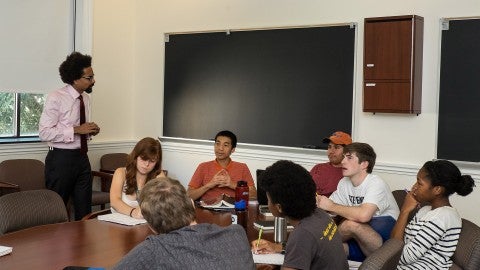Department of History Graduate Research and Travel Funding Policy
Travel funds are available to assist with travel to conferences and/or to conduct research during the academic year or the summer break.
Submitting an funding request, which includes an advisor's statement of support, is mandatory. Funding requests are reviewed by the Director of Graduate Studies and the Travel Funding Subcommittee.
Note the following timetable:
- Deadline: Applications are due by the last day of each month and should be submitted at least two months in advance of travel.
- Review: Submitted applications are reviewed by the Graduate Travel Funding Subcommittee once a month, beginning on the first business day of each month.
- Decisions: Decision letters will be sent to each applicant by the 10th business day of the month.
Approved funding awards will be remitted via lump sum via direct deposit to the student's bank account on file in iO. Like all awards, travel awards over $600 are subject to taxes.
NOTE: If a trip is anticipated, but not confirmed (i.e. awaiting an acceptance letter from a conference), a Travel Funding Request should still be submitted within the appropriate round of funding with a statement outlining the circumstances of the request.
PLEASE NOTE the following guidelines when submitting an application and calculating a travel budget:
1) With the exception of the Dean’s Conference, Research, and Professionalization Fund, students are expected to apply for outside funding whenever possible to defray costs to the department.
2) The travel budget should be as comprehensive as possible. Submit a budget for the ENTIRE trip, regardless of anticipated outside funding. Use this downloadable budget template. You MUST "show your work" regarding major expenses like flights and accommodation. Include links or screenshots to show how you came up with your budget.
3) Per diem for meals and incidentals will be awarded at a flat rate of $20 per day for travel day and $30 per day for on-site days. Per diem for extended research trips (versus conference travel) is to be determined. Contact the Director of Graduate Studies with any questions.
4) For trips by automobile, mileage should be budgeted per the Rice University Rate.
5) Outside funding support received after submitting the travel request must be reported to the Graduate Administrator. The amount of outside funding will be deducted from the amount provided by the History Department.
6) If travel dates change or the trip is cancelled after the application is approved, the student must notify the Graduate Administrator ASAP. NOTE: If the trip is shortened by several days, the original funding amount may be readjusted. For example: If a two-week research trip is approved for $2,000, the budget may be readjusted if the actual trip is shortened to one-week.
7) Students are encouraged to share rooms at conferences to minimize costs.
International Trips:
Students who travel internationally on Rice funds are required to register their trip in the Rice Travel Registry: https://apps.ideal-logic.com/ricetravel
Your registered trip will automatically link with Crisis24, the new platform to assist Rice travelers abroad. More about Crisis24 can be found here: https://global.rice.edu/travel-resources/crisis24.
International students must comply with all OISS policies and regulations prior to travel.
Request Form and Budget Template:
Conference and Research Travel Funding Request Form >>
Budget Template (downloadable spreadsheet to be included in funding request) >>
Selection criteria (funding priorities) for graduate student research/travel funding in the Department of History (as approved by the Graduate Committee on 2/14/18):
1. As a general rule, students seeking funding for their first conference/research travel of the year receive priority.
2. As a general rule, students who have entered Ph. D. candidacy are permitted to seek one conference funding per semester.
3. As a general rule, students must enter Ph. D. candidacy before seeking conference travel funding. Conference travels before entering candidacy may be approved under special circumstances.
4. As a general rule, students must be presenting research that is directly tied to their dissertation project to receive travel funding.
5. To the extent possible, due attention will be paid to an equitable distribution of funds among all students in degree candidacy and in good standing.
6. Cost overruns will not be approved in the absence of extenuating circumstances evidenced by appropriate documentation.
7. Out-of-cycle requests will only be considered if there are extenuating circumstances evidenced by appropriate documentation.
8. Students cannot seek funds to pay for their sixth (and seventh, etc) year tuition.

